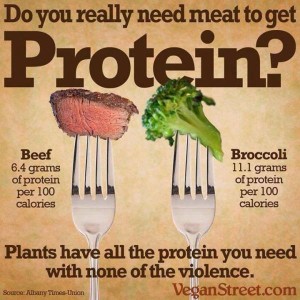Do you really need meat to get protein? VeganStreet.comsays no. The activist group posted this graphic in the Albany Times-Union stating that, “Beef has 6.4 grams of protein/100 calories” and “Broccoli has 11.1 grams of protein/100 calories,” but is that the whole story?
Let’s look at it this way: one cup of broccoli contains 31 calories, which means you would have to eat more than 3 cups of broccoli to get 11.1 grams of protein. Moreover,VeganStreet.com underestimates the grams of protein in a serving of beef. A 3-oz. serving of beef provides 25 grams of protein. Active individuals, pregnant women and growing teens are encouraged to get 75-80 grams of protein/day, which would mean you would have to eat 24 cups of broccoli to reach that 80 grams of recommended protein vs. 9-10 oz. of protein (the size of a decent steak) to reach thoseprotein recommendations.
Additionally, not all proteins are created equal. According to beefitswhatsfordinner.com, “Not all foods contain the same type of protein. Meat, eggs and dairy products are considered complete high-quality sources of protein that provide the full package of essential amino acids needed to stimulate muscle growth and improve weight management. Plant proteins such as grains, legumes, nuts and seeds are incomplete proteins in that they do not provide sufficient amounts of essential amino acids. In fact, research indicates that increasing consumption of high-quality complete proteins may optimize muscle strength and metabolism, and ultimately improve overall health.
“Lean meats contain heme iron, which is much more easily absorbed by the body than nonheme iron found in plant foods. Heme iron is an important dietary component for promoting cognitive health, including memory, ability to learn and reasoning. Heme iron is particularly beneficial for growing children because research indicates that some toddlers are at higher risk for iron deficiency, and childhood iron-deficiency anemia is associated with behavioral and cognitive delays.
“Unlike plant proteins, beef is the food supply’s most easily absorbed source of iron. In addition, beef is an excellent source of readily available zinc. The absorption of zinc from beef is about four times greater than that from a high-fiber breakfast cereal. As with iron, including meat in your diet also improves the absorption of zinc from other foods.”
A recent article in CBS Atlanta entitled, “Study: Vegetarians Less Healthy, Lower Quality Of Life Than Meat-Eaters,” further bolsters my point.
Benjamin Fearnow writes, “Vegetarians may have a lower BMI and drink alcohol sparingly, but vegetarian diets are tied to generally poorer health, poorer quality of life and a higher need for health care than their meat-eating counterparts. A new study from the Medical University of Graz in Austria finds that a vegetarian diet — characterized by a low consumption of saturated fats and cholesterol that includes increased intake of fruits, vegetables and whole-grain products — carries elevated risks of cancer, allergies and mental health disorders. Vegetarians were twice as likely to have allergies, a 50% increase in heart attacks, and a 50% increase in incidences of cancer.
“Overall, vegetarians were found to be in a poorer state of health compared to other dietary groups. Vegetarians reported higher levels of impairment from disorders, chronic diseases, and suffer significantly more often from anxiety/depression. Chronic problems associated with vegetarians and people eating carnivorous diets rich in fruits and vegetables were linked to more frequent visits to doctors, which the study authors suggest requires public health programs to reduce the health risk due to their nutritional factors.”
What do you think about the above articles? How would you respond to the misinformation presented by VeganStreet.com? Please spread the word to help counter the false information spread by this activist group.


